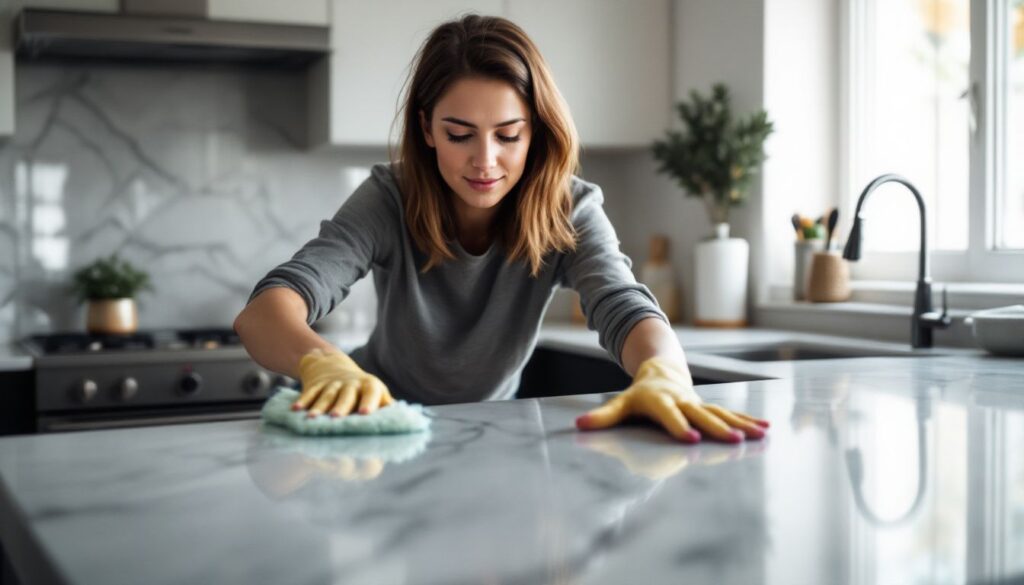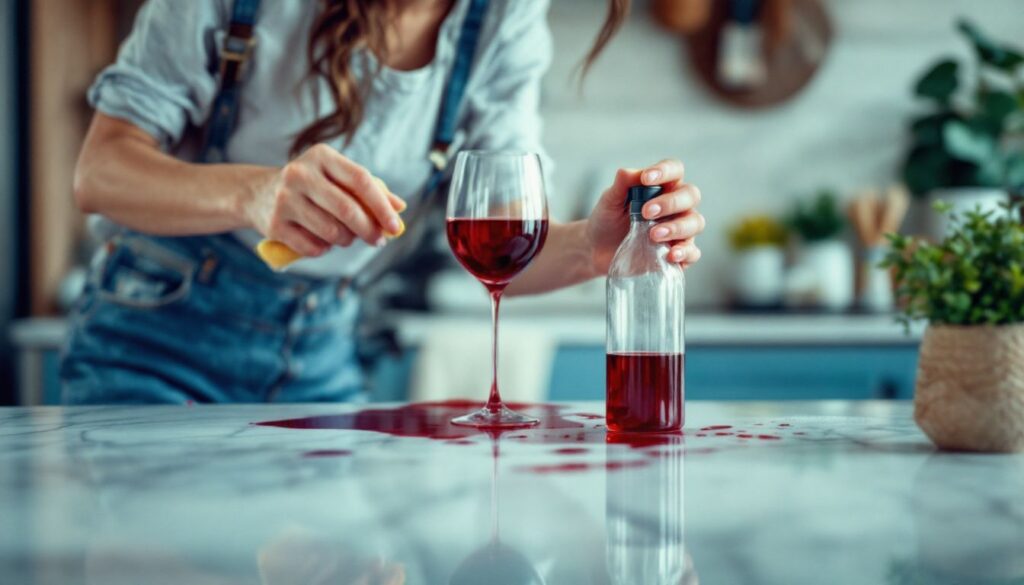Table of Contents
Ever found yourself with a sinking feeling How Do I Remove Stains from Countertops? then you notice a fresh stain marring your beautiful countertop? You’re definitely not alone. Whether it’s the rich granite or elegant marble, any kitchen can quickly go from pristine to panic mode when spills occur.
Ah, the joys of cooking and living!
Lucky for us, diving deep into research has unveiled some pretty effective strategies to tackle this all-too-common dilemma. It turns out that materials like laminate or quartz aren’t just about looks; they demand their own tailor-made cleaning solutions.
This guide is packed with insights on lifting stains of all kinds—be they oil-based disasters or water-based woes—using simple tools and nature-friendly products. So, if you’re eager to bring back that gleam without resorting to harsh chemicals, stick around!
Key Takeaways
- Use baking soda and water to remove tough stains from most countertops. This mix is safe and natural.
- Vinegar can clean up food and beverage spills effectively, but use it carefully on marble since it’s strong.
- Commercial stain removers are good for hard-to-remove spots. Check the label to make sure it fits your countertop type.
- A poultice made from baking soda can pull out deep stains. Cover with plastic wrap and leave overnight for best results.
- To keep countertops looking new, clean spills right away, use coasters, and seal stone surfaces regularly.
Understanding Different Types of Countertops
Countertops come in many types. Each type has its own way of cleaning and caring for it.
Granite
Granite is a popular choice for kitchen countertops. It looks good and lasts a long time. This natural stone comes in many colors and patterns. We love its durability, too. Granite can resist heat and scratches well.
Stains can still happen on granite surfaces. Food, drinks, oil, or cleaning chemicals may leave marks. Thankfully, there are ways to fix these stains easily. We can use natural solutions like baking soda or vinegar for countertop stain removal on granite countertops.
Regular care helps keep our granite looking great!
Marble
Marble is a beautiful choice for our countertops. It shines and feels smooth. We love its classic look in kitchens and bathrooms. Marble can stain easily, so we need to be careful.
Food, drinks, and oils can leave marks on it. For example, red wine or olive oil can create tough stains.
To remove stains from marble countertops, we start with mild cleaning methods. Using natural cleaners like baking soda mixed with water works well for oil-based stains. For water-based spots, a vinegar solution is helpful but use it sparingly since vinegar can be strong on marble surfaces.
Stain removal for marble countertops requires care and attention to keep them looking new and clean.
Laminate
Laminate countertops are popular for their budget-friendliness and variety. They come in many colors and styles, making it easy to find one that fits our kitchen. Cleaning laminate surfaces is simple but we need to act fast when stains happen.
Food, drinks, or oils can leave marks on the surface.
For stain removal for laminate countertops, we use gentle cleaners first. A mix of baking soda and water works well for tough spots. We must avoid harsh chemicals that could damage the finish.
Regular maintenance helps keep our kitchens looking great while preventing new stains from forming.
Tile
Tile countertops are popular. They come in many colors and patterns. We can easily clean tile surfaces when stains occur. Food and beverage spills are common culprits for staining tiles.
Oil and grease can also leave marks.
To remove stains from tile, we start by identifying the type of stain. Using a mild cleaner first is wise. If that does not work, we can try a commercial stain remover or a poultice made from baking soda and water.
Regular cleaning helps prevent stains from setting in our kitchen countertops. Keeping them sealed will protect the grout lines too, which often trap dirt and grime.
Butcher Block
Butcher block countertops are popular for their warmth and style. They can be made from various woods, like maple or oak. These surfaces are great for chopping and food prep. However, they can also stain easily from food and drinks.
To keep our butcher block looking nice, we must clean it regularly. We should avoid harsh chemicals that might damage the wood. Instead, we can use natural cleaners like vinegar or baking soda to remove stains safely.
Regular oiling helps protect the surface too.
Quartz
Quartz countertops are popular for many homeowners and business owners. They come in a variety of colors and patterns, making them visually appealing. These surfaces resist stains well, especially oil-based and water-based stains.
Cleaning quartz is easy with mild soap and water.
For tougher stains, we can use baking soda or special commercial stain removers. Regular maintenance keeps our quartz looking great. Avoid harsh chemicals that might damage the surface over time.
By cleaning kitchen countertops naturally, we can prolong their life and keep them beautiful. Using simple techniques helps us enjoy our quartz without worry about stubborn marks or spots.

Glass
Glass countertops look beautiful and modern. They can also be sensitive to stains. Food, drinks, and even oils can leave marks on the surface. We should clean spills right away to prevent staining.
For removing stains from glass countertops, we recommend using a soft cloth with mild soap and water. Avoid harsh cleaners that may scratch the surface. If there are tough spots, a mixture of baking soda and water works well for natural countertop stain removal.
Always rinse with clean water after cleaning to keep them shiny and clear.
Stainless Steel
Stainless steel countertops are popular in many homes and businesses. They look sleek and modern. Cleaning stainless steel is simple, but it can get stains. Food and grease can leave marks.
To remove stains from kitchen surfaces, we need to act quickly.
For oil-based stains, a gentle scrub with warm soapy water works well. We can also use baking soda for tough spots. Just make a paste with water and scrub gently. For cleaning hard water stains, vinegar helps a lot too! It removes the spots without scratching the surface.
Regular maintenance keeps our stainless steel looking great!
Concrete
Concrete countertops are stylish and strong. They can also stain easily if we do not clean them properly. Common stains on concrete include food, oil, and chemical spills. For cleanup, we use a mild soap with water first.
If the stains persist, we can try baking soda mixed with water to scrub the area gently.
For tougher stains, a poultice can help draw out the stain from the surface. We spread it over the stain and let it sit for a while before wiping it away. Keeping our concrete countertops sealed will also protect them from future stains.
Regular cleaning is key to maintaining their look and feel in our kitchens or businesses.
Common Types of Countertop Stains
Stains can come from many sources. Food and drinks often leave marks on surfaces. Oil and grease stains are also common in kitchens. Cleaning products can cause their own problems too.
Food and Beverage
Food and beverage stains can be very annoying. These marks often come from spills like coffee, juice, or wine. They can quickly ruin the look of our kitchen countertops. For granite countertops, we need to act fast to avoid deep stains.
Water-based stains may lift easily with soap and water. Oil-based stains require a different approach.
Using baking soda mixed with water helps tackle tougher food spots on surfaces. We can create a paste and apply it directly on the stain. Let it sit for a few hours before wiping it away gently.
If we notice any residue left behind after cleaning, using commercial stain removers can also help remove those stubborn marks effectively.
Oil and Grease
Oil and grease stains can be tricky on countertops. They often come from cooking oils or greasy foods. These stains can ruin the look of our surfaces if we don’t act fast. To remove oil-based stains from countertops, we need to start with the right approach.
First, we should use a mild cleaner like baking soda mixed with water. This helps lift the stain without scratching our counters. If that doesn’t work, we can try a commercial stain remover designed for kitchen countertops.
For tougher spots, a poultice made from flour and vinegar is effective too. Keeping our countertops clean will help prevent these annoying oil and grease stains in the future.
Chemical and Cleaning Products
Chemical stains can be tough on countertops. Some cleaning products contain strong chemicals that can damage surfaces like granite and quartz. Always check the label before using them.
We need to avoid harsh cleaners on natural stone surfaces.
Instead, we can choose milder options. Baking soda and vinegar work wonders for many stains. They are safe for most surfaces too. For serious stains, consider a commercial stain remover made specifically for kitchens.
Using the right product helps keep our countertops looking great while effectively removing oil-based and water-based stains from various kitchen surfaces.
Essential Tools and Materials for Countertop Stain Removal
To remove stains from countertops, we need the right tools and materials. Simple items like baking soda and vinegar work well. Commercial stain removers are also helpful for tough spots.
Using a poultice can pull out deeper stains effectively. Each of these tools plays an important role in cleaning surfaces properly. Want to learn more about how to use them? Keep reading! or If you need more tips or resources, don’t hesitate to look around or ask experts from Rock Solid Tops for help.
Baking Soda
Baking soda is a great tool for removing stains from countertops. We can use it to clean many surfaces, like granite and quartz. To remove stains, mix baking soda with water to make a paste.
Apply the paste on the stain and let it sit for about 10-15 minutes. Then, gently scrub the area with a soft cloth or sponge.
Using baking soda helps us tackle oil-based and water-based stains naturally. It’s safe and effective for kitchen countertop cleaning. This simple solution makes our cleaning routine easier while keeping our surfaces looking fresh.
Vinegar
Vinegar is a powerful tool for removing stains from countertops. It works well on many surfaces, like granite and quartz. We can mix vinegar with water to create a safe cleaner. This solution helps lift food and beverage stains easily.
For tougher stains, we can use vinegar full strength. Apply it directly on the stain and let it sit for a few minutes before wiping it clean. Using vinegar is one way to keep our kitchen surfaces fresh without harsh chemicals.
Commercial Stain Removers
Commercial stain removers can help us tackle tough stains on our countertops. They come in many forms, like sprays and wipes. We should always check the label to make sure it’s safe for our countertop type.
Some products work well on granite, while others are better for quartz or laminate surfaces.
Using a commercial stain remover is easy. Apply it directly to the stained area. Let it sit as directed before wiping it away with a clean cloth. This method can save time when removing oil-based or water-based stains from countertops.
Always read instructions carefully to achieve the best results!
Poultice
A poultice is a thick paste that helps remove tough stains from countertops. We can make it using baking soda and water. This mix works well for stains caused by food, oil, or chemicals.
We apply it directly to the stain. Then we cover it with plastic wrap and let it sit for several hours or overnight.
Afterward, we can wipe away the dried poultice with a damp cloth. If needed, we repeat this process until the stain fades. It’s a natural way of removing countertop stains without harsh chemicals.
Using poultice is safe for many surfaces like granite, marble, and quartz.
Step-by-Step Countertop Stain Removal Techniques
We can start by finding out what type of stain we have. Then, we will use the gentlest method first to see if it works.
Identify the stain type
To remove stains from countertops, we must first identify the type of stain. Food and beverage spills leave different marks than oil or grease. Each countertop material reacts differently too.
For instance, granite and quartz surfaces may handle stains better than laminate or butcher block.
Water-based stains can be easier to clean than oil-based ones. Knowing what caused the stain helps us choose the best method for cleaning it. This step is key in our journey to restoring our kitchen surfaces effectively.
Start with the mildest cleaning method
We should always start with the mildest cleaning method. Gentle cleaners are safe for all types of countertops. Baking soda mixed with water works well for many stains. We can apply it to the stain and let it sit for a few minutes.
Next, we can gently scrub the area with a soft cloth or sponge. This helps lift the stain without damaging our surfaces. If this does not work, we can try vinegar as another option.
It is natural and effective against some stains too. Using these simple methods often keeps our kitchen looking fresh and clean.
Using a poultice
A poultice is a great method for removing tough stains from countertops. We can make one using common items like baking soda and water. Mix these until you have a paste. Spread the mixture on the stain and cover it with plastic wrap.
This traps moisture and helps the poultice work better.
Leave it on for several hours or overnight. After that time, we can wipe off the poultice with a damp cloth. Rinse the area well to remove any residue. This technique works well for kitchen surfaces, especially when removing oil-based stains from countertops like granite or quartz.
Other DIY solutions
We can use simple solutions found at home to clean stains from countertops. For example, mixing baking soda with water makes a great paste. We apply this paste directly on the stain and let it sit for 10-15 minutes before scrubbing gently.
Another effective option is vinegar combined with water. This mix cleans many types of stains naturally. We spray it on the area and wipe it down with a soft cloth. These DIY methods help in removing countertop stains naturally and are easy to do for both homeowners and business owners.
Prevention and maintenance tips.
We can keep our countertops looking great with simple steps. Wipe up spills right away to stop stains from setting in. Use coasters and cutting boards to protect surfaces from heat, cuts, and scratches.
Regular cleaning helps maintain the shine of kitchen countertops.
For deeper cleaning, we can use gentle cleaners instead of harsh chemicals. A mix of baking soda and water works well for tough spots on granite or quartz countertops. Always test any cleaner on a small area first.
Regular sealing is also key for stone surfaces like granite and marble to prevent stains effectively.
For more insights, check online guides or consult experts from Rock Solid Tops for advice tailored to your needs. Taking action now will lead us closer to achieving our dream spaces with stunning surfaces.

FAQs
How Do I Remove Stains from Countertops?
Removing stains from countertops depends on the material like Granite and Marble or Laminate. The best way involves using a surface cleaner and scrubbing technique that’s suitable for your countertop type, whether it’s granite, quartz or plastic laminate.
How can I get rid of oil-based stains on my kitchen surfaces?
To remove oil-based stains from countertops, you need a specific cleaning method which could involve a bleach alternative and proper scrubbing.
Are there different methods for removing water-based and oil-based stains from countertops?
Yes, the process of stain removal for kitchen countertops varies depending on whether the stain is water-based or oil-based.
Can this guide help with maintaining all types of kitchen surfaces?
Yes! This complete guide covers everything from removing stains from plastic laminate countertops to maintaining granite and quartz surfaces.
Do I need special products for removing stains from my granite countertop?
While some cleaners are universal, certain materials like granite may require specific products or techniques for effective stain removal.

